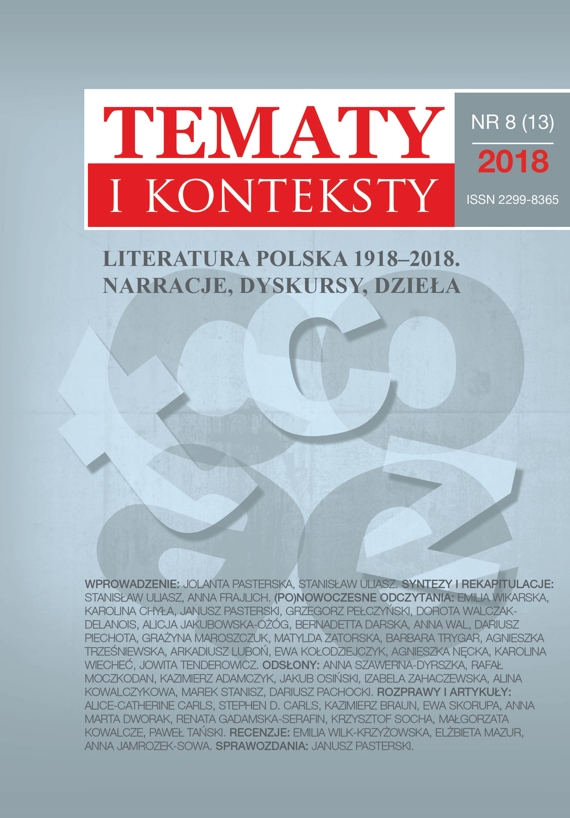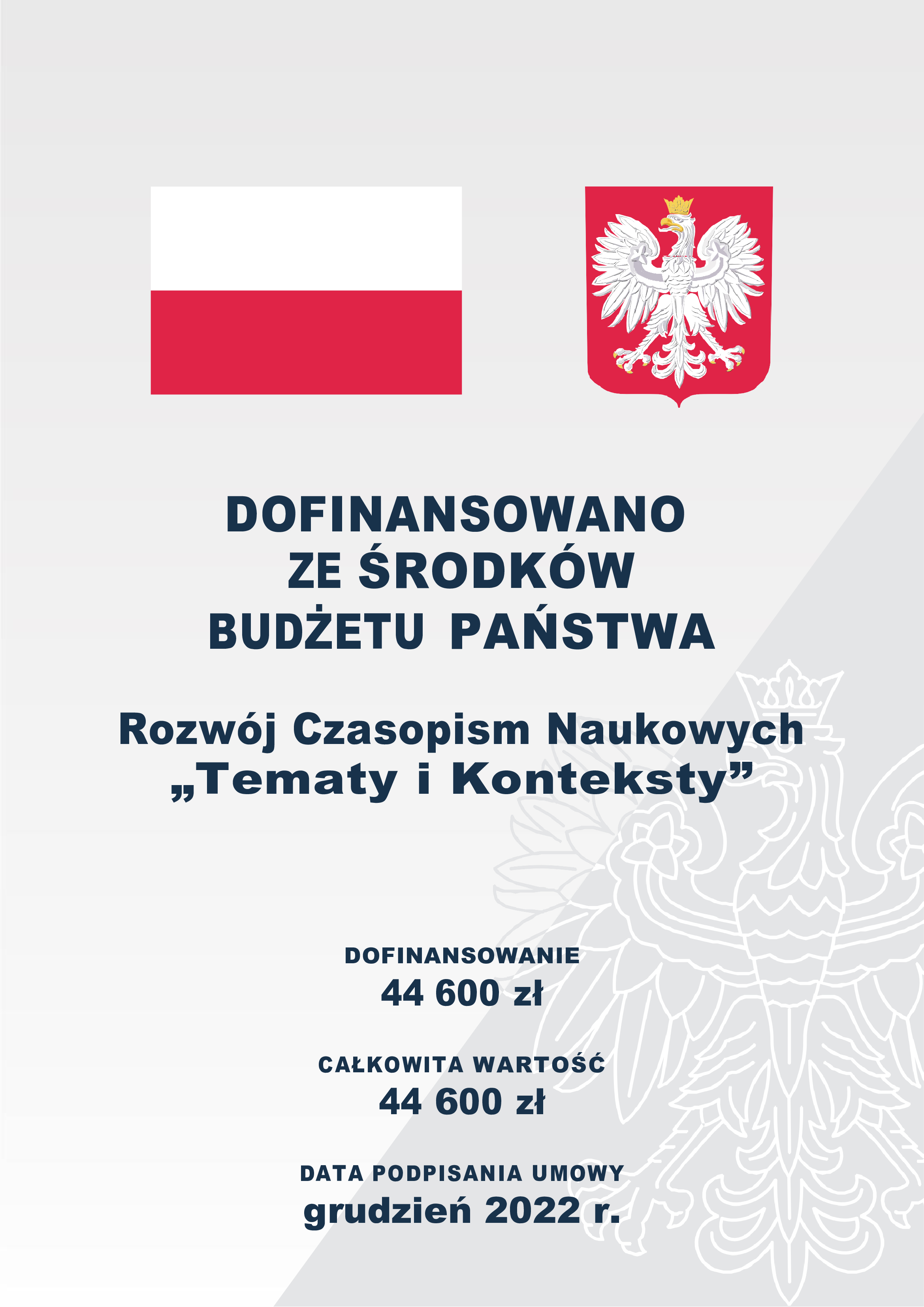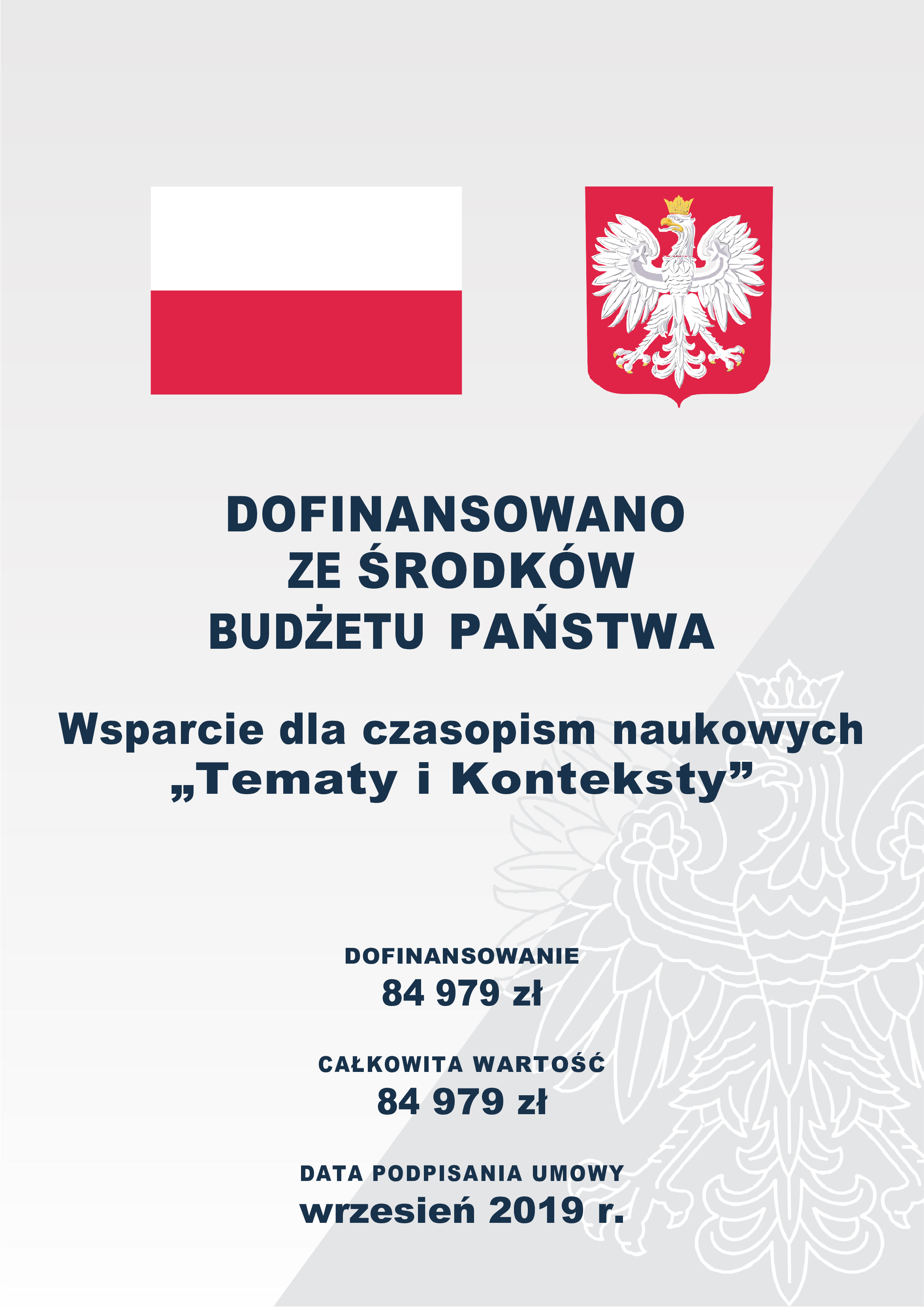Kresy (Polish Eastern Borderlands) in Polish literature of the period of 1918–2018. Significant interpretative perspectives
DOI:
https://doi.org/10.15584/tik.2018.2Keywords:
Polish Eastern Borderland, borderland discourse, Polish literature of 1918-2018, myths and legends, borderland of cultures, small homelands, controversies over the category of “Kresy” (Eastern Borderlands of Poland), postcolonial criticismAbstract
The paper offers a comprehensive, synthetic account of the Polish Eastern Borderland discourse on the subject over the course of the last century. It analyzes the ways in which the understanding of the notion of Kresy and “borderland”, as well as the strategies of presenting the term have been changing, including the attempts to replace this category with other terms. Furthermore, the paper characterizes the dynamics concerning the transformations of situational contexts which emerged in the period of the Second Polish Republic, developed in the times of World War II, after 1945 (in the country and abroad), and continue from the 80s and 90s of the twentieth century to our present. Significant interpretative perspectives include, among others, the trend of literary schools, the legend and myth of Polish Eastern Borderland, the notion of the borderline of cultures, small homelands, and methodological phrases and breakthroughs (spatial turn, geopoetics, postcolonial criticism).
Downloads
References
Astafiew A., Mifologema stepu i literatura stepu, „Kievski Połonistyczni Studji” [Kijów] 2012, t. XIX, s. 296–312.
Bakuła B., Kolonialne i postkolonialne aspekty polskiego dyskursu kresoznawczego (zarys problematyki), „Teksty Drugie” 2006, nr 6.
Bartoszewicz J., Znaczenie polityczne Kresów Wschodnich dla Polski, Warszawa 1924.
Beauvois D., Moja przygoda z Kresami, „Ruch Literacki” 1989, z. 4–5.
Bieńkowski Z., Przyszłość przeszłości. Eseje, Wrocław 1996.
Błoński J., Bezładne rozważania starego krytyka, który zastanawia się, jak napisałby historię prozy polskiej w latach istnienia Polski Ludowej, „Teksty Drugie” 1990, nr 1.
Błoński J., Polski raj, „Tygodnik Powszechny” 1987, nr 51–52.
Brown K., Kresy. Biografia krainy, której nie ma, tłum. A. Czwojdrak, Kraków 2013.
Czaplejewicz E., Pragmatyka, dialog, historia. Problemy współczesnej teorii literatury, Warszawa 1990.
Czaplejewicz E., Kasperski E., Literatura i różnorodność. Kresy i pogranicza, Warszawa 1996.
Czapliński P., Poruszona mapa. Wyobraźnia geograficzno-kulturowa polskiej literatury przełomu XX i XXI wieku, Kraków 2016.
Czapliński P., Wzniosłe tęsknoty. Nostalgie w prozie lat dziewięćdziesiątych, Kraków 2001.
Czapliński P., Śliwiński P., Literatura polska 1976–1998. Przewodnik po prozie i poezji, Kraków 1999.
Dąbrowski M., Kresy w perspektywie krytyki postkolonialnej, „Porównania” 2008, nr 5.
Dąbrowski M., Swój/obcy/inny. Z problemów interferencji i komunikacji międzykulturowej, Izabelin 2001.
Drewnowski T., Próba scalenia. Obiegi – wzorce – style, Warszawa 1997.
Dubyk H., Sen o Ukrainie. Pogłosy „szkoły ukraińskiej” w literaturze polskiej dwudziestolecia międzywojennego, Warszawa 2014.
Dutka E., Próby topograficzne. Miejsca i krajobrazy w literaturze polskiej XIX i XXI wieku, Katowice 2014.
Dwie dekady nowej (?) literatury 1989–2009, red. S. Gawliński i D. Siwor, Kraków 2011.
Dwudziestolecie 1918–1939. Odkrycia. Fascynacje. Zaprzeczenia, red. naukowa A. S. Kowalczyk, T. Wójcik, A. Zieniewicz, Warszawa 2010.
Fiut A., Spotkania z Innym, Kraków 2006.
Galician Polyphony. Places and Voices, Edited by A. Molisak and J. Wierzejska, Warsaw 2015.
Gosk H., Opowieści „skolonizowanego/kolonizatora”. W kręgu studiów postzależnościowych nad literaturą polską XX i XXI wieku, Kraków 2010.
Habielski R., Utopia kraju lat dziecinnych (Emigracja powojenna wobec Kresów), „Kresy” 1995, nr 2(22), s. 74–80.
Hadaczek B., Duma o Kresach Rzeczypospolitej (osnuta na motywach literackich), „Rocznik Lwowski” 2010–2011, Warszawa (2011), s. 215–221.
Hadaczek B., Historia literatury kresowej, Kraków 2011.
Hadaczek, Kresówki (Kresy w literaturze polskiej), Szczecin 2011.
Janion M., Wobec zła, Chotomów 1989.
Jarzębski J., W Polsce czyli wszędzie. Szkice o polskiej prozie współczesnej, Warszawa 1992.
Jasiewicz K., Zagłada polskich Kresów. Ziemiaństwo polskie na Kresach Północno-Wschodnich Rzeczypospolitej pod okupacją sowiecką 1939–1941. Studium z dziejów zagłady dawnego narodu politycznego, Warszawa 1998, s. 18.
Kersten K., Jałta – mit i rzeczywistość, w: Jałta z perspektywy półwiecza, red. S. Nicieja, Opole 1995.
Kieniewicz S., Kresy. Przemiany terminologiczne w perspektywie dziejowej, „Przegląd Wschodni” 1991, t. I, z. 1, s. 3–13.
Kolbuszewski J., Dramat pomniejszania granic, „Odra” 1989, nr 11.
Kolbuszewski J., Kresy, Wrocław 1995.
Kopka K., Powrót Kresów, „Tygodnik Literacki” 1991, nr 13–14.
Kresomania. Z prof. Danielem Beauvois rozmawia A. Sabor, „Książki w Tygodniku”. Dodatek do „Tygodnika Powszechnego” 2006, nr 13.
Kresy – dekonstrukcja, red. K. Trybuś i in., Poznań 2007.
Kresy – pojęcie i rzeczywistość. Zbiór studiów, red. K. Handke, Warszawa 1997.
Kresy Rzeczpospolitej. Wielki mit Polaków, „Polityka. Pomocnik Historyczny” 2015, nr 2.
Kresy w literaturze. Twórcy dwudziestowieczni, red. E. Czaplejewicz i E. Kasperski, Warszawa 1996.
Krzyżanowski R. J., A paradise lost? The image of „Kresy” in contemporary polish literature, w: American Contributions to the Eighth Inter. Congress of Slavists, vol. 2, 1978, Columbus, Ohio, s. 391–421.
Kultura pogranicza wschodniego. Zarys encyklopedyczny, red. T. Budrewicz, T. Bujnicki i J. S. Ossowski, Warszawa 2011.
Kulturowa teoria literatury. Główne pojęcia i problemy, red. M.P. Markowski, R. Nycz, Kraków 2012.
Kurzowa Z., Elementy kresowe w języku powieści powojennej, Warszawa 1975.
Lednicki W., Pamiętniki, t. 1, Londyn 1963.
Les confins de l`ancienne Pologne. Ukraine, Lituanie, Bielorussie XVI–XX siecles, ed. D. Beauvois, Preface C. Miłosz, Presses Universitaires de Lille, 1988.
Majewska W., Z Lwowskiej Fali do Radia Wolna Europa, Wrocław 2006.
Malownicza ruina utopii. Rozmowa z prof. Jackiem Kolbuszewskim, autorem książki „Kresy”, „Polityka” 1995, nr 48, s. 45–46.
Mazur A., Imiona Księgi Kresowej, „Kresy” 1991, nr 8.
Meysztowicz W., Poszło z dymem. Gawędy o czasach i ludziach, Warszawa 1989.
Mieroszewski J., Finał klasycznej Europy, wybrał, oprac. i wstępem opatrzył R. Habielski, Lublin 1997.
Między Polską etniczną a historyczną, red. W. Wrzesiński, Wrocław 1988.
Miłosz C., Rodzinna Europa [Paryż 1958], Warszawa 1990.
Miłosz C., Szukanie ojczyzny, wyd. II, Kraków 1996.
Mit Galicji, red. J. Purchla i in., Kraków 2014.
Na pograniczach literatury, red. J. Fazan, K. Zajas, Kraków 2012.
Narracje migracyjne w literaturze polskiej XX i XXI wieku, red. H. Gosk, Kraków 2012.
(Nie)obecność. Pominięcia i przemilczenia w narracjach XX wieku, red. nauk. H. Gosk, B. Karwowska, Warszawa 2008.
Nowe dwudziestolecie (1989–2009). Rozpoznania. Hierarchie. Perspektywy, red. nauk. H. Gosk, Warszawa 2010.
O dialogu kultur wspólnot kresowych, red. S. Uliasz, Rzeszów 1996.
Paźniewski W., Gramatyka rozproszenia, Sosnowiec 1995.
Pogranicze kulturowe (odrębność – wymiana – przenikanie – dialog). Studia i szkice, red. O. Weretiuk i in., Rzeszów 2009.
Pojęcie ojczyzny we współczesnych językach europejskich, red. J. Bartmiński, Lublin 1993.
Polskie mity polityczne XIX i XX wieku, red. W. Wrzesiński, Wrocław 1994.
Poszukiwanie realności. Literatura – dokument – Kresy. Prace ofiarowane Tadeuszowi Bujnickiemu, red. S. Gawliński i W. Ligęza, Kraków 2003.
Radyszewskij R., Polski romantiki „ukrajnskoj szkoli”, Kijów 2009.
Rybicka E., Miejsce, pamięć, literatura (w perspektywie geopoetyki), „Teksty Drugie” 2008, nr 1–2, s. 19–32.
Sapa D., Między polską wyspą a ukraińskim morzem. Kresy południowo-wschodnie w polskiej prozie lat 1918–1988, Kraków 1998.
Sawicka J., Wołyń poetycki w przestrzeni kresowej, Warszawa 1999.
Skirmuntt K., Idea jagiellońska a polityka kresowa, Wilno 1925.
Skórczewski D., Teoria – literatura – dyskurs. Pejzaż postkolonialny, Lublin 2013.
Stempowski J., W dolinie Dniestru. Listy o Ukrainie, wybrał, oprac. i posłowiem opatrzył A. S. Kowalczyk, Warszawa 1993.
Stempowski J., W dolinie Dniestru. Pisma o Ukrainie, wybrał, oprac., posłowiem i przypisami opatrzył A. S. Kowalczyk, Warszawa 2014.
Studia postkolonialne nad kulturą i cywilizacją polską, red. K. Stępnik i D. Trześniowski, Lublin 2010.
Szaruga L., Dochodzenie do siebie. Wybrane wątki literatury po roku 1989, Sejny 1997.
Szaruga L., Kresy w prozie Teresy Lubkiewicz-Urbanowicz, „Szczecińskie Prace Polonistyczne” („Kresy w literaturze”) 1999, nr 10.
Szaruga L., Palimpsest Międzymorza (zarys problematyki), „Tekstualia” 2008, nr 1(12).
Szaruga L., Problem literatury kresowej w okresie PRL-u, „Szczecińskie Prace Polonistyczne” („Kresy w literaturze”) 1994, nr 6, s. 23–34.
Szydłowska J., Narracje pojałtańskiego Okcydentu. Literatura polska wobec pogranicza na przykładzie Warmii i Mazur (1945–1989), Olsztyn 2013.
Taylor N., Dziedzictwo W.X. Litewskiego w literaturze emigracyjnej, „Kultura” [Paryż] 1986, nr 10 (469), s. 124–136.
Thompson M. E., Trubadurzy imperium. Literatura rosyjska i kolonializm, przeł. A. Sierszulska, Kraków 2000.
Uliasz S., Literatura Kresów – kresy literatury. Fenomen Kresów Wschodnich w literaturze polskiej dwudziestolecia międzywojennego, Rzeszów 1994.
Uliasz S., O literaturze Kresów i pograniczu kultur. Rozprawy i szkice, Rzeszów 2001.
Uliasz S., Z problemów polskiej literatury kresowej, w: Pejzaże kultury. Prace ofiarowane Profesorowi Jackowi Kolbuszewskiemu w 65. rocznicę Jego urodzin, red. W. Dynak i M. Ursel, Wrocław 2005.
Wańkowicz M., Anoda – Katoda. Było to dawno, wybór, układ i oprac. tekstów T. Jodełka-Burzecki, Kraków–Wrocław 1986.
Wiegandt E., Literacka kariera małych ojczyzn, w: Słowa i metody. Księga dedykowana profesorowi Jerzemu Święchowi, red. A. Kochańczyk i in., Lublin 2009.
Wiegandt E., Literackie formy świadomości kresowej, „Polonistyka” 1997, nr 4.
Wierciński A., Przywracanie pamięci, wyd. 2, rozszerzone, Opole 1997.
Wisner H., Wojna nie wojna. Szkice z przeszłości polsko-litewskiej, Warszawa 1978.
Witkowski L., Uniwersalizm pogranicza. O semiotyce kultury Michała Bachtina w kontekście edukacji, Toruń 1991.
Z Kresów na Kresy. Wielkie przesiedlenie Polaków, „Polityka. Pomocnik Historyczny” 2016, nr 4.
Zadencka M., W poszukiwaniu utraconej ojczyzny. Obrazy Litwy i Białorusi w twórczości pisarzy emigracyjnych (Florian Czarnyszewicz, Michał Kryspin Pawlikowski, Maria Czapska, Czesław Miłosz, Józef Mackiewicz), Uppsala 1995.
Ziejka F., Nasza rodzina w Europie. Studia i szkice, Kraków 1995.
Ziemilski A., Miasto kresowe Polski międzywojennej: mit i rzeczywistość, „Odra” 1983, nr 4.
Żurawski P. vel Grajewski, Kresy – dzieje pewnego pojęcia, www. teologiapolityczna.pl
Downloads
Published
How to Cite
Issue
Section
License
Copyright (c) 2018 Tematy i Konteksty

This work is licensed under a Creative Commons Attribution-NonCommercial-NoDerivatives 4.0 International License.




